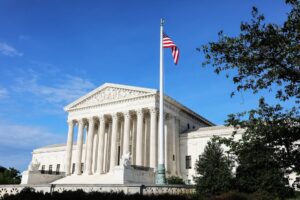ButSpeak.com
News which Matters.

In a significant decision on Friday, the U.S. Supreme Court ruled that bankrupt companies are not entitled to refunds to compensate for a disparity in bankruptcy fees that persisted from 2018 to 2020. The court determined that U.S. taxpayers should not bear the burden of refunds totaling hundreds of millions of dollars.
In a 6-3 opinion, Justice Ketanji Brown Jackson wrote that Congress intended to raise bankruptcy fees uniformly and had already addressed the disparity by increasing rates in North Carolina and Alabama, the only two states that initially charged lower fees. Refunds to debtors in the other 48 states, which saw 98% of large bankruptcies, would cost taxpayers $326 million and create “extreme disruption” to bankruptcy courts across the country.
The issue originated from a 2017 law that increased quarterly fees for large companies to fund the U.S. Trustee, the Justice Department’s bankruptcy oversight program. North Carolina and Alabama, which opted out of the U.S. Trustee program, did not immediately raise their fees, creating a disparity deemed unconstitutional by the Supreme Court in 2022.
The Supreme Court’s previous ruling did not address whether the higher fees should be refunded. However, several courts of appeals ruled that debtors deserved refunds, leading the Justice Department to seek Supreme Court review of a $2.5 million refund awarded to John Q. Hammons Hotels & Resorts. The bankrupt hotel company, which filed for Chapter 11 protection in Kansas in 2016, paid the higher fees after the 2017 law took effect.
In a dissenting opinion, Justice Neil Gorsuch, joined by Justices Clarence Thomas and Brett Kavanaugh, argued that the disparate fees were unconstitutional and that “refund is the traditional remedy for unlawfully imposed fees.” Gorsuch criticized the majority opinion, writing, “What’s a constitutional wrong worth these days? The Court’s answer today seems to be: not much.”
This decision underscores the court’s stance on maintaining fiscal responsibility and minimizing disruption within the judiciary system, even as it addresses constitutional concerns.